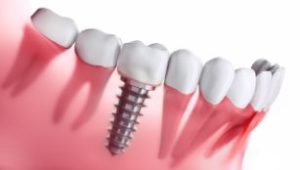 If you’re missing teeth, dental implants are one of the best investments you can make in your oral health. But, like any investment, you want to take care of it to make sure it serves you well for as long as possible. That includes proper care and maintenance in the short-term as well as the long-term! In addition to keeping the area around your implant clean, your post-procedure diet will also make a big difference in your success. In this blog, you’ll find out what the best dietary choices are after getting implants and get some great tips to keep your implants strong and healthy for many years!
If you’re missing teeth, dental implants are one of the best investments you can make in your oral health. But, like any investment, you want to take care of it to make sure it serves you well for as long as possible. That includes proper care and maintenance in the short-term as well as the long-term! In addition to keeping the area around your implant clean, your post-procedure diet will also make a big difference in your success. In this blog, you’ll find out what the best dietary choices are after getting implants and get some great tips to keep your implants strong and healthy for many years!
What Should You Eat After Getting Dental Implants?
Most patients say they can’t believe how much easier their procedure was compared to what they expected. While that’s certainly a good thing, it is still a minor surgery that requires some care and attention to heal well.
This can vary somewhat, but it usually takes between 5-7 days for most of the swelling and discomfort to subside. For that week, it’s important to avoid hard, crunchy, or sticky foods like nuts, hard fruits and vegetables, popcorn, and crusty bread.
Instead, primarily include these foods into your diet:
- Breakfast – Eggs, oatmeal, smoothies, protein shakes, yogurt, mashed avocado with spices, or mashed bananas with brown sugar
- Lunch – Soup (with small, soft vegetables), cottage cheese, applesauce, chicken or tuna salad, hummus
- Dinner – Pasta, meatloaf, cooked vegetables, refried beans with guacamole, couscous or rice, mashed potatoes, macaroni and cheese, soft bread
- Snacks – Baked apples, frozen yogurt, pudding or custard
Also, let any hot foods cool down quite a bit before eating them, don’t drink alcohol, and avoid drinking straws.
What Else Can You Do In the Long-Term To Care For Your Implants?
Dental implants can last many years or even a lifetime – with the right maintenance! After the first 3-6 months, when your implants have fully integrated, here’s what you can do to ensure their long-term success:
- Get regular checkups – Routine checkups are critical to make sure the bone levels around your implants are healthy and that the crown, bridge, or denture attached to the implant is functioning properly.
- Do well with brushing and flossing – Implants can’t get cavities, but they still need clean, healthy gum tissue to support them, just like natural teeth. Ask a dentist or hygienist to show you how to properly floss all the way under the gumline.
- Use the right tools – Some patients benefit from an electric toothbrush or an oral irrigator.
Healing after an implant procedure will be over before you know it. And, with these tips for ongoing maintenance, you’ll be on your way to many years of great oral health!
About the Author
Dr. Laura Merker is a board-certified periodontist who completed her training in Periodontics and Implant Dentistry at New York University. After an implant procedure, she always explains how her patients can maintain their new smile to make sure it looks and feels great for as long as possible. If you have any questions about dental implants, she can be reached via her website.
